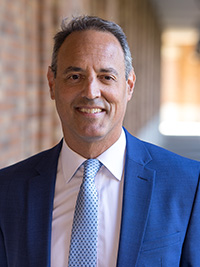
Graduate Certificate in AI & ML for Engineering
NEXT START DATE: Fall 2026
DEADLINE: June 1, 2026
Applications open in January 2026
LOCATION
Online
DURATION
9 months part-time
TIMES
Mostly asynchronous
TOTAL COST
$16,480
Program highlights
The Graduate Certificate in Artificial Intelligence (AI) and Machine Learning (ML) for Engineering equips engineers to use modern data-driven AI and ML methods. This certificate can be completed independently or combined with other eligible data-intensive certificates in the College of Engineering to create a stacked Master of Science in Artificial Intelligence and Machine Learning for Engineering.

AI & ML tools for engineering
Learn how to use AI and ML methods tailored towards physical, chemical, and engineered systems.

Designed for working engineers
Online, part-time 16-credit graduate certificate with courses that can be adapted to your skills and engineering discipline.

Stackable towards a master’s degree
You can choose to combine the certificate with another eligible certificate to create a stacked master's degree.
Who is this program for?
This certificate is designed for engineers who want to apply modern AI and ML methods to their field, particularly for applications with physical constraints, such as manufacturing, chemical processes, or robotics. Students will advance their careers by building on their traditional engineering expertise and learn how to apply data-driven techniques to engineering use cases.
Stay updated by joining our mailing list.
Learning outcomes
Implement and evaluate AI & ML methods
Choose and implement the appropriate AI and ML methods for specific engineering applications, and learn how to evaluate the results of using these methods.
Build foundational AI & ML skills
Strengthen math and coding skills, creating a foundation that enables you to adapt to changing AI and ML tools throughout your career.
Communicate methods and results
Practice and receive feedback on communicating your work using data visualization, verbal presentations, and written reports.
Courses
The Graduate Certificate in Artificial Intelligence and Machine Learning for Engineering is an online 16-credit graduate certificate. It includes:
- 5-credit foundations course
- 4-credit math course
- 3-credit physics-informed machine learning course
- 2-credit AI & machine learning project
- 2 credits of seminar or electives
Except for the electives, these courses are designed in a modular format, combining required modules, core modules, and elective modules. This structure allows students to specialize in techniques based on their initial skill level and engineering discipline.
Foundations of Machine Learning for Engineering
Foundational skills for using AI and ML methods. Math and coding skills, AI ethics, and an overview of applications in engineering.
Data-Driven Optimization
Optimization techniques used across modern engineering, including machine learning and control theory. Covers fundamentals, case studies, and deep-dive topics.
Physics-Informed Machine Learning
Machine learning algorithms applied to scientific and engineering problem solving. Includes an applied project.
Foundations of Machine Learning for Engineering
The first course in the certificate builds foundational skills for using artificial intelligence and machine learning techniques in engineering. This includes mathematical and coding skills, an introduction to types of artificial intelligence and machine learning algorithms, and an overview of how artificial intelligence and machine learning can be applied to engineering applications. Also includes a brief introduction to ethics in AI. This is a required course. Offered in Fall. 5 credits.
Data-Driven Optimization
Applied optimization is the backbone of modern data-driven modeling and machine learning. This course covers optimization techniques used across modern engineering, including in machine learning and control theory. This course covers both optimization fundamentals and deep-dives into relevant topics, such as convex vs. nonconvex optimization, constrained optimization, high-dimensional and stochastic techniques for big data, and computational techniques. This course satisfies the certificate math requirement. Offered in Winter. 4 credits.
Physics-Informed Machine Learning
This course covers core machine learning algorithms as they apply to scientific and engineering problem solving. Examples include how to enforce known, or partially known physics into machine learning algorithms and how to discover new physics with machine learning. Topics include physics-informed neural networks, digital twins, interpretable and generalizable models, and reinforcement learning. Coursework includes case studies and an applied project that incorporates skills learned throughout the certificate. This is a required course. Offered in Spring. 4 credits.
Machine Learning for Engineering Project
This course covers core provides students the opportunity to apply skills learned during previous graduate work in our program. Students practice end-to-end implementation of learned methods to solve intermediate and advanced problems and evaluate their work from the perspectives of efficacy, accuracy, safety, and ethics. This is a required course. Offered in Spring. 2 credits.
Certificate stackability
Students can choose to take the certificate independently or combine it with another eligible data-intensive certificate to create a Stacked Master of Science in Artificial Intelligence and Machine Learning for Engineering. This certificate can also be stacked as part of the Master of Engineering in Multidisciplinary Engineering degree.
Admission requirements
Applicants need a 3.0 cumulative grade-point average on a 4-point scale from an accredited school and meet specific coursework requirements listed on the admissions page. To be considered for admission, applicants should submit a resume, statement of purpose, and unofficial/electronic transcripts.
*This certificate program is not eligible for F1/J1 international students who require an I-20/DS-2019 to enroll at UW. Non-U.S. citizens in the U.S. who do not require an I-20/DS-2019 to study and have the ability to be a student, can be admitted to the certificate. Students wishing to complete the online certificate while remaining outside of the United States are eligible to apply. Students in that situation may want contact ai4eng-advising@uw.edu to understand access options and requirements for synchronous participation.
Featured instructors
Steve Brunton
Professor, Mechanical Engineering
Adjunct Professor, Applied Mathematics
Professor Brunton serves as the Director of the AI Center for Dynamics & Control and holds the position of Data Science Fellow at the eScience Institute. His research combines techniques in dimensionality reduction, sparse sensing, and machine learning for the data-driven discovery and control of complex dynamical systems. Additionally, he develops adaptive controllers using machine learning within an equation-free framework. His work spans applications in fluid dynamics, such as closed-loop turbulence control, as well as in neuroscience, medical data analysis, networked dynamical systems, and optical systems.

Nathan Kutz
Professor, Electrical & Computer Engineering
Professor, Applied Mathematics
Professor Kutz is a distinguished scholar in applied mathematics, with extensive contributions to numerical methods, scientific computing, data analysis and interdisciplinary research. Throughout his career of several decades, he has significantly advanced mathematical theory while addressing practical challenges in fields such as nonlinear optics, fluid dynamics, neuroscience, and video and image processing. As an esteemed educator and researcher, Professor Kutz continues to inspire and mentor future generations of mathematicians and scientists.

Michelle Hickner
Assistant Teaching Professor,
Department of Mechanical Engineering
Hickner has served in a variety of teaching roles at the University of Washington, focusing on hands-on and experiential learning. Her scholarly interests include engineering education, sensing and control in animal flight, and data-driven system identification. Her past work has included running the UW mechanical engineering composite shop, and research and development of devices for airborne particle handling.
This program was developed with funding support from The Boeing Company.